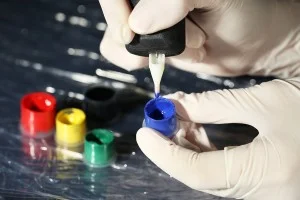A brand serves as an important placeholder for your company’s reputation. This means good business for you and peace of mind for your customers. When people have a good experience with a brand, they’re more likely to make a repeat purchase. In other words, they become brand loyal, even when given the choice to buy a competing product. This leads to brand recall, and the cycle repeats itself resulting in enormous growth potential.
 Here’s something to contemplate. Rumor has it that more people have the motorcycle brand Harley-Davidson™ tattooed on their body than any other brand name in the world. Whether its truth or fiction, it’s at least plausible. Now that’s loyalty!
Here’s something to contemplate. Rumor has it that more people have the motorcycle brand Harley-Davidson™ tattooed on their body than any other brand name in the world. Whether its truth or fiction, it’s at least plausible. Now that’s loyalty!
If you’ve been reading my series on Branding, by now you now that we’re talking about a process of creating distinctive and durable perceptions in the minds of your customers. We do this by distilling what your company represents down to its purest essence- something that your target audience can grasp in a matter of moments – a look, a feel, a song, a sound.
The effort to brand your company or yourself can pay off handsomely, sometimes to the tune of billions of dollars. In my branding talks, I refer to this as a business’ growth factor. The brand of the #1 soft drink company in the world is so tightly monitored – so Mega – that I’m at risk using their name in this article for possible intellectual property right infringement.
However, that company’s CEO once famously said he could walk into any bank anywhere in the world and take out a loan….based on their brand value alone! Imagine that kind of clout in your business.
In fact, this soda company’s global market penetration is so strong that people can identify the white-on-red logo even without seeing the brand name. I don’t even have to say their name, but I’m sure you know which soda company I’m talking about. We’re talking about a growth factor to salivate over.
People who closely identify with a brand are not only more likely to buy what they bought a second time, but they also will buy related items from the same brand. In fact, they’ll recommend the brand to others and even remain brand faithful in spite of a competitor’s price cut. That’s the kind of brand identity that anchors true loyalty and spurs mega growth.
I know you’re asking “How can I relate this to my business?”
So the question to ponder is this…how can you take these lessons and generate your own brand growth factor? Here are 3 practical recommendations to get your customers to stick to make repeat purchases.
1. Make It Memorable:
Your company can’t benefit from referrals and repeat business if people don’t remember your name. When it comes to making your brand memorable, try using an unusual color combination, the way FedEx does with their purple and orange. Use shapes and sounds that convey your brand’s image, or even distinctive behavior or gesture. Jingles, cartoon characters and spokesmen are great for this.
We all remember our first trip to Les Schwab Tires, because the mechanics are trained to drop their tools and literally run to your car to provide service. Savvy career professionals use a style of clothing to make their personal brand memorable. Author Tom Wolfe was known for his famous white suits, and Flo from Progressive Insurance is unmistakable with her retro look and flippant attitude.
Develop your own unique image and make it stick in the minds of your buying public.
2. Keep It Familiar:
Branding has a big effect on customers and non-customers alike. Think about that catchy jingle that just won’t get out of your head. It’s familiar, isn’t it?
Psychologists have found that familiarity leads to affinity. In other words, when people get to know you, they like you. This means people who have never even done business with you may recommend you even when they’re not your customers – simply because they know your brand. Seeing your ads around town, having one of your pens in their desk drawer, or seeing your social media posts all add up to contributing to your growth factor. Those who are familiar with your brand will spread the word the next time a friend or colleague is looking for your kind of referral.
3. Be Rock Solid:
When consumers make a buying decision, there’s less risk in choosing a brand name over an unknown commodity. With an established brand, you can spread the respect you’ve garnered. This means your latest, greatest product, service or location can gain acceptance in spite of newcomer status. But start by being reliable in the first place. Mind your reputation, and keep it clean.
For fun, I play the jazz trombone in a 17-piece swing band. Recently our band was hired to perform in our region’s largest winery, Chateau Ste Michelle, where we delighted visitors with party music to augment their wine tasting experience at the chateau. Ste Michelle established a good reputation with regional winery tours which are close to a major metropolitan city, thereby solidifying its brand and goodwill with millions of wine lovers. Subsequently, the winery added brand extensions to their mix with new sub-brands at various price points. With this approach, the primary brand benefits from the positive perceptions generated from both their premier line and their affordable line.
Following these 3 steps to brand recall can lift what you sell out of the realm of a commodity and contribute to your growth factor. Instead of dealing with price-shoppers, you’ll have customers who would gladly pay more for your company’s goods and services.
Who could ask for anything more?
 Bryan Heathman is the President of Made for Success. He works with bestselling authors and consultants which have included the late Zig Ziglar, Donald Trump and John C. Maxwell in the role of publisher and marketer. Bryan is the author of Conversion Marketing, a marketing book on converting website visitors into paying customers. Bryan’s Fortune 500 experience includes working for Microsoft, Eastman Kodak and Xerox.
Bryan Heathman is the President of Made for Success. He works with bestselling authors and consultants which have included the late Zig Ziglar, Donald Trump and John C. Maxwell in the role of publisher and marketer. Bryan is the author of Conversion Marketing, a marketing book on converting website visitors into paying customers. Bryan’s Fortune 500 experience includes working for Microsoft, Eastman Kodak and Xerox.
